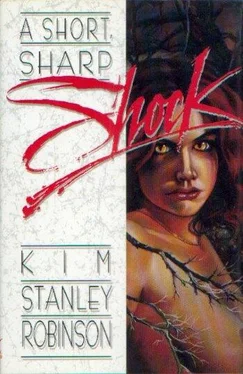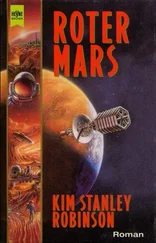“It’s the same for them,” she said.
The following morning they woke with the dawn and the facewomen led them to their horses and waved farewell as they rode off. The horses were exuberant with running and galloped over the dunes waving their heads from side to side like blind things, eating the air and snapping at their riders if they were interfered with. So they hung on and rode: Garth’s horse led, the swimmer’s brought up the rear. Thick white thunderheads grew over the water to the south, and the colors of everything in the long morning light were richer than they remembered them being, the water a dark glassy blue outside jade green shallows, the foam on the breakers as white as the clouds, the dune grass subtle dusty greens, the red barky hair of their horses an irresistible magnet for the eye. The horses ran along the beach until midday, then cantered up onto the dunes and browsed on the sparse grass. The three riders dismounted stiffly and hobbled them, then walked down to the beach to forage for beach food to supplement the little the facewomen had been able to give them. They ate on the beach, returned to the horses and slept, then in the midafternoon rode again. They traveled so much faster than they could have on foot that it was hard to grasp: they were already far from the facewomen’s meadow, and the horses ran on tirelessly through the long glary stretches of late afternoon, until at sunset they trotted to a halt and stood in a wind-protected dip between two dunes, browsing easily through the mauve dusk.
They rode like that for days. Each day the peninsula became lower, narrower, more stripped of life. The thick mats of dune grass reduced to occasional patches, the tufts of grass as sparse as the hair on a balding man. Each tuft had been blown in every direction by the winds, creating a perfect circle of smoothed hard sand around it, deepest at the outer edge; the dunes became geometrical worksheets, sine waves covered with circles. One sunset walking in this deeply patterned sand Thel looked down at a tuft of grass and the perfect circle around it, and thought That is your life: a stalk of living stuff blown in every direction, leaving a brief pattern in sand.
They had emptied the facewomen’s bags of food, and went hungry as the beach provided less and less. One morning Garth plucked two of the fruit from his shoulder tree and offered them to Thel and the swimmer. “I can eat grass,” he told them. “More grass, more fruit. Really. Please. We can’t afford to spend all day on the beach foraging.”
Thel said, “If we stopped in the late afternoon instead of at dusk, we could forage more, and you could eat more too.” He scuffed dubiously at the tough dune grass, so sharp edged you could easily cut skin with it. Garth also spent every evening with his feet buried in the sand; presumably more of that would help too, but it was something Garth didn’t talk about.
He did agree to the early stops, however, and so every morning after that Thel and the swimmer ate one of his bitter electric shoulder apples, and felt the chemical tang of it course through them. It was wonderful how well the apples satisfied their appetites, how long they could subsist on them. And Garth ate dune grass in the evenings, and spent time with his feet buried in the sand, and got thinner; but the apples continued to bloom on his shoulder tree, tiny fragrant white blossoms giving way to hard green nubs, which grew quickly into edible fruit.
Then as they rode down the endless spit of the peninsula, even the grasses disappeared. They were on a desert shore, beach on both sides of a low mound of dunes; even the horses had to be fed from Garth’s tree, and he had to spend the whole of every afternoon with his body stretched out to the sun, and his feet stuck deep in the sand—haggard, exhausted, a small smile playing over his mouth. “I was told tales of this, how one of us could grow enough to sustain his fellows in a time of need. Like having children, they always said, and now I know what they mean.” And he looked at them with a gaze they could scarcely return, so filled was it with a kind of amused maternal affection.
Every morning thunderheads billowed up and sidled across the southern sky, but never hit their stretch of the coast, piling up instead against the mountainous spine far behind them. They found pools of water in holes in the sandstone, proof of storms past, but these had grown brackish with beach dew, and the travelers became thirsty as well.
After many days of this deprivation, they saw in the distance ahead a small knob in the peninsula. Dune grasses returned to the central mound, and they came across more pools of water. Days passed and it seemed they would reach the knob the following afternoon for several days running, but it was bigger than they had first thought, and kept receding.
Finally it loomed up, several hundred feet tall, like a sandstone lighthouse. They skirted it on the wide southern beach, and on the other side discovered a most extraordinary thing: the beach stretched out into the blue sea, and got thinner and lower, until it sank under the water. “It’s the end!” Thel cried.
“No no,” Garth said. “It’s the water gate. I’ve heard stories about it. Look out there, see that smudge? It’s the other cape, where the peninsula proper begins again. In between is a tidal bar. This is the lowest part of the spine, nothing more. At low tide a strip of sand will emerge as fine as any road, and stay above the waves for half the day.”
It proved to be true. As the afternoon progressed the beach extended farther into the water, which was racing from north to south in a strong current, breaking whitely in a straight line that divided the sea. This stretch of white foam boiled furiously in a line to the horizon and the distant smudge of the farther cape. Then in a matter of moments, it seemed, the Whitewater divided and fell away into two sets of waves rolling in from right and left, leaving a strip of wet gray sand and wet brown rock standing between them. The breakers tumbled in over rocky shallows on both sides, but the bar stood clear of them. And the spine trail extended even here: squarish blocks of water-holed rock had been laid in a path over the bar, making a causeway a foot or two higher than the bar itself.
“The horses can’t cross that,” Garth said. “The rock would tear up their hooves.”
“But surely it’s more than one tide’s walk across?” the swimmer said.
Garth nodded. “Still we must send the horses back, as we said we would.” And he kicked and shouted at the horses, threw rocks at them until they cantered off, and circled nervously, then regarded each other and broke for home, flowing down the beach like a school of red fish darting through the sea.
Something moved on the side of the knob and they jumped, turned to look. It was a man the same color as the sandstone, his skin the same grainy dark brown. As he approached they saw he was naked, and that his eyes, his hair—everything—was the brown of the rock. In his eyes the color seemed darker, the way the rock did when it was wet.
He stopped before them and said, “I am Birsay the guide. It is more than one tide’s walk to cross the brough, as you noted. This is how we do it; there is a rise near the halfway point, and we run to that in one low tide, on a path that I have built. It is just possible, though you get your legs wet. There on the rise I have left several large, holed rocks. We tie ropes I have made to those anchors, and as the water rises we rise on it, floated by slings I have made of kelp bladders and wood. The current pushes us out, usually to the south, but we are tied by the ropes to the anchor rocks, and when the tide ebbs, we float down to a landing, and complete the crossing of the brough to the other cape.”
Читать дальше












